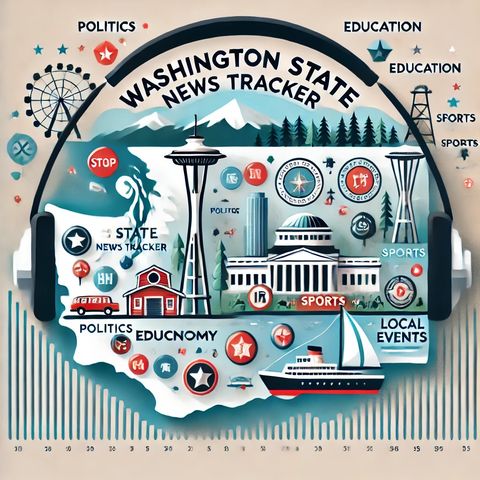Washington State Legislature Passes 340 Bills in 2024 Session, Addressing Climate, Education, and Public Safety

Download and listen anywhere
Download your favorite episodes and enjoy them, wherever you are! Sign up or log in now to access offline listening.
Washington State Legislature Passes 340 Bills in 2024 Session, Addressing Climate, Education, and Public Safety
This is an automatically generated transcript. Please note that complete accuracy is not guaranteed.
Description
Washington state recently concluded its 2024 legislative session, which ran from January 8 to March 7, 2024. During this 60-day session, lawmakers proposed over 1,000 bills, with approximately 340 passing...
show moreAmong the notable bills passed, several aimed to enhance public safety and education. For instance, a bill requiring bleeding control kits in schools was approved, along with legislation expanding school curricula to include LGBTQ+ perspectives and fentanyl-use prevention[3]. Additionally, bills to expand the business and occupation tax exemption for child care providers and increase capacity for fingerprint-based background checks for child care workers were also passed.
In the realm of climate and energy, the legislature approved a bill to merge Washington's carbon market with those in California and Quebec, a top priority for Governor Inslee. Furthermore, House Bill 1589, which accelerates Puget Sound Energy's transition away from natural gas, narrowly passed[3].
Labor-related legislation also saw significant movement. Senate Bill 6194, which establishes a framework for legislative employees to form unions and negotiate contracts, was agreed upon. This bill allows employees to bargain on whether they are at-will employees or can only be terminated for just cause[3].
Other notable bills included a ban on child marriage, which was signed into law, and legislation making Lunar New Year a Legislature-recognized holiday. The legislature also passed bills reducing the time mortuaries must hold unclaimed human remains and banning octopus farming in the state[3].
However, several high-profile proposals did not make it through the session. These included a bill to provide unemployment insurance to undocumented workers and a proposal to require hospitals and health systems to report more information about mergers and their impact on care[3].
In terms of local government decisions, the Washington Department of Veterans Affairs (WDVA) highlighted several bills that may impact veterans, families, or military members. These included bills related to veterans' benefits and support services, though specific details on their status were not provided[4].
On the economic front, major business developments included the passage of bills aimed at supporting small school districts and adjusting school districts' authority to contract indebtedness for school construction[5]. Additionally, legislation creating a professional license for spoken language interpreters and translators was approved.
In community news, education saw significant attention with the passage of bills such as HB1915, which makes financial education instruction a graduation prerequisite and a required component of public education[5]. Public safety was also a focus, with bills like HB1240 establishing firearms-related safety measures to increase public safety.
Environmental and weather updates included the passage of HB1589, which supports Washington's clean energy economy and transitions to a clean, affordable, and reliable energy future[5]. This bill aligns with Governor Inslee's priorities on climate action.
Looking ahead, Washington residents can expect continued discussions on key issues such as labor rights, public safety, and environmental policies. The upcoming elections and the 2025 legislative session will likely see renewed efforts on bills that did not pass this year, including proposals for unemployment insurance for undocumented workers and increased oversight of hospital mergers. Additionally, the implementation of new wildfire-related building codes and the creation of new fire risk maps by the Department of Natural Resources will be closely watched. As the state continues to navigate these critical issues, residents and policymakers alike will be keenly interested in the outcomes of these ongoing debates.
Information
| Author | QP-4 |
| Organization | William Corbin |
| Website | - |
| Tags |
Copyright 2024 - Spreaker Inc. an iHeartMedia Company

Comments